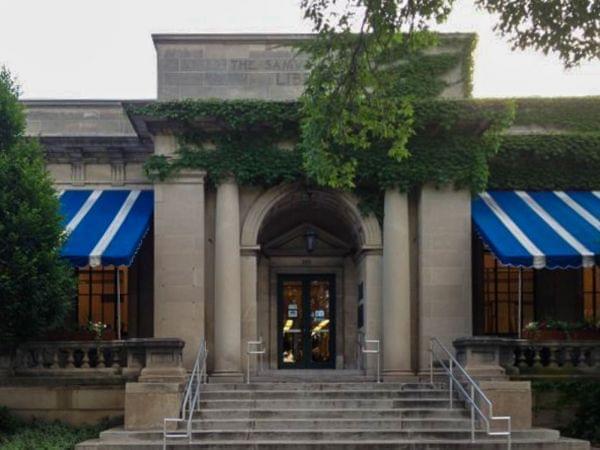Urbana Free Library Scrutinized Over Book Weeding

The Urbana Free Library in Urbana, Ill. (Sean Powers/WILL)
The head of the Urbana Free Library says communication errors among staff led to too many books being removed from circulation, and shipped to an Internet bookseller.
According to a story in the online magazine, Smile Politely, Executive Director Debra Lissak instructed staff to get rid of books in the non-fiction print collection that were published before 2003 to make room for new material.
The story led to a flurry of comments from readers:
- “I hope Urbana is able to rebuild its library and get the kind of library services it deserves.”
- “How DARE they do this with our resource, our money? I am so upset I am practically shaking.”
- “This just....doesn't make any sense. I can't wrap my mind around how someone could make such an obviously ridiculous decision.”
But Lissak dismissed Smile Politely’s report, saying books that were 10 years old weren’t simply taken off of the shelves because of their age. Instead, she maintained books that old were put on a list and evaluated for things like physical condition, frequency of use, and historical significance.
“I did not know such large numbers were coming off, and perhaps in that sense I am responsible and should have been watching,” Lissak said. “I am not in the habit of watching what they’re doing in terms of collection because these are the people that work with the public and they buy the collection and they withdraw the collection. So, that’s their normal job role. So, it’s probably remiss that I wasn’t watching, but I wasn’t watching.”
The library also weeded out certain collections because of its plans to install self-checkout stations. As a result of this new feature, every item in the library’s collection needs to be re-tagged.
To save time and money tagging all of the books, the library’s Board of Trustees gave the librarians the go-ahead to first weed out lesser-used and older books that may be eventually removed.
“They hired all of these people to do the tagging of the books. Since the tags were late, there was an unfortunate overlap of people not having much to do, so I think that’s why the project of weeding went faster than it probably should have,” said Mary Ellen Farrell, the president of the Urbana Free Library’s Board of Trustees.
The librarians who were working on the book weeding would have been supervised by Adult Services Director Anne Phillips, who was out of the office. With her gone, Lissak said those employees should have come to her instead if they had questions.
“For some reason, they felt I wanted a large amount (of books) to go,” Lissak explained. “I wish when they thought that and were alarmed by that, they would have stopped to ask.”
Farrell said there was a clear communication breakdown that occurred that she hopes is addressed by this whole situation.
“I think if there’s a big project that’s happening, what needs to improve is communication about who does what, and who asks who when there’s a question,” Farrell said.
Lissak said about 30,000 non-fiction books made it on the list to possibly be weeded out, but she does not know how many titles were actually taken off of the shelves for good. Books affected included those on computer science, philosophy and physiology, religion, social sciences, language, science, and technology.
“Those are areas where taking out things that are 10 years is probably a good thing, and buying newer things is probably a good thing,” Lissak said.
Lissak noted that a collection of art books were removed and sent to the online retailer, Better World Books, but she said those books are coming back to the Urbana Free Library. She also said the popular sections of gardening and cookbooks are either coming back in the return shipment or are still on the shelves and not yet evaluated.
However, other books that were removed will not be returned.
"This wasn’t intended to have ill consequences for our community, and we’ll certainly hope that they have restored trust when we get through the whole process,” Lissak said.
Meanwhile, Carol Tilley, a University of Illinois library science professor, said the Urbana library should not only improve interdepartmental communication, but also consider revising its criteria for weeding out certain books.
“For something more focused on art history, gardening, or religion, or something less quickly datable content area, having a strong back collection probably makes sense,” Tilley said.
“You can’t use the same set of criteria for every portion of the collection,” she added. “I think you have to take into account the subject as you are making weeding decisions to figure out what makes the most sense for that area.”
But Farrell said it would be way too complicated to change the criteria for certain genres, but not others.
“It would take a million years to weed a collection,” she said. “You need to have criteria and the standard criteria are exactly what we followed as far as our policy. The policy itself doesn’t have to change.”

